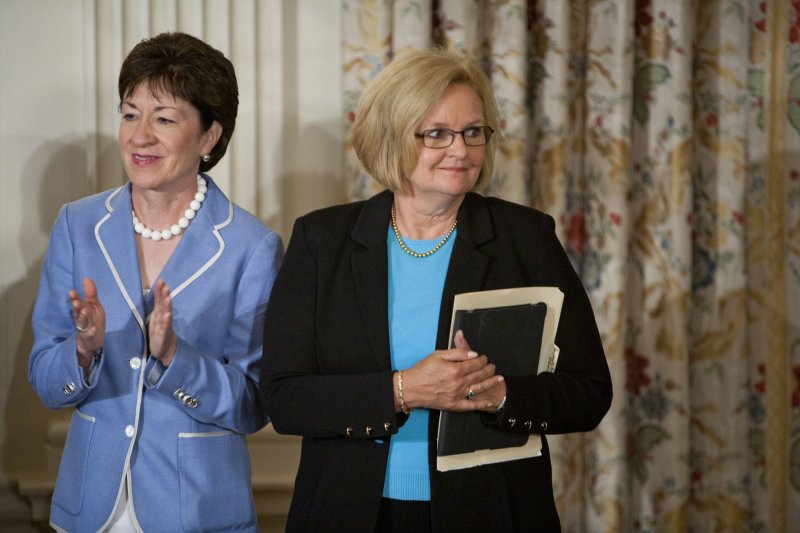Senators Susan Collins, R-Maine, (L) and Claire McCaskill, D-Mo., unveiled a compromise proposal Tuesday that would exempt partially business income from the tax a surtax the wealthy, but other Republicans said the proposal wasn't enough to win their support to extend the Social Security payroll tax cut. UPI/Brendan Hoffman/Pool |
License Photo
WASHINGTON, Dec. 7 (UPI) -- Sen. Lindsey Graham of South Carolina said Wednesday he and other Senate Republicans prefer a tax credit instead of an extension of the payroll tax cut.
"I think that is a smart idea," Graham told Politico. "It's a way to provide tax relief without raiding the Social Security trust fund. That appeals to me too because I've been trying for years to fix Social Security.
"The problem with the payroll tax holiday is it's coming out of Social Security, so you shouldn't be robbing seniors to pay for tax cuts that can be done with a tax credit."
Federal law requires funds appropriated from the Social Security trust fund to be replaced "from the general fund."
Rob Portman of Ohio, Pat Toomey of Pennsylvania and Richard Burr of North Carolina are among those Senate Republicans said to be on board with the idea, with Roy Blunt of Missouri and Kelly Ayotte of New Hampshire saying they at least would consider it, the Washington publication said.
Members of both U.S. congressional chambers are scrambling to come up with a plan to extend the savings American workers have enjoyed the past year through the payroll tax cut.
Senate Majority Leader Harry Reid said his chamber likely will vote Friday on the Democrats' latest proposal, which would lower the Social Security payroll tax to 3.1 percent and would include a 3.25 percent surtax on people who make more than $1 million a year as an offset.
If the payroll tax cut expires Dec. 31, more than 160 million middle-class taxpayers would see their tax bills rise an average $1,000, impacting the still-fragile economic recovery, the Obama administration said.
Senate Republicans have talked about working to find a compromise with Democrats that would keep the payroll tax rate at 4.2 percent next year, rather than allowing it to revert to 6.2 percent, but they reject the surtax.
"I think most Americans, most Republicans, are very reluctant to raise taxes on anyone during this economic crisis that we find ourselves in," Senate Minority Leader Mitch McConnell said Tuesday.
Sens. Susan Collins, R-Maine, and Claire McCaskill, D-Mo., unveiled their compromise proposal Tuesday that would exempt business income partially from the tax on the wealthy, but McConnell and other Republicans said the proposal wasn't enough to win their support, The Hill reported.
House Republicans were working on their own proposal while keeping in mind Tea Party movement members who want offsets and worry about adding to the federal deficit and siphoning off payments to Social Security, The Washington Post reported.
House leaders said they will keep debating the issue for the next few days and are unlikely to take a vote until next week.
House leaders said they hope to draw support from conservatives by bundling the payroll tax extension with other priorities, such as a rider that would make it more likely that construction would begin soon on a controversial oil pipeline from Canada to the Gulf Coast or language that would delay implementation of environmental regulations, The Hill said.
President Barack Obama said Wednesday he would reject any effort to tie a payroll tax cut extension to the pipeline or other issues.
"If the payroll tax cut is attached to a whole bunch of extraneous issues not related to making sure that the American people's taxes don't go up on Jan. 1, then it's not something that I'm going to accept," Obama said after a meeting with Canadian Prime Minister Stephen Harper.
"And I don't expect to have to veto it because I expect they're going to have enough sense over on Capitol Hill to do the people's business, and not try to load it up with a bunch of politics."
In any case, the ideas have been greeted tepidly on Capitol Hill.
"The riders are great, I love the riders, but the key is the extent to which we are mortgaging our future," said Rep. Jeff Flake,R-Ariz., one of the GOP's most outspoken critics of extending the payroll tax cut.















